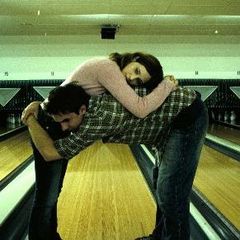
They don't make 'em like they used to, but that sure doesn't stop them from trying. I am more a fan of contemporary cinema than any of the black and white Hollywood hey day movies. I've tried to branch out in recent years, even making a summer noir series of my own with
Laura,
The Maltese Falcon,
The Third Man, and
Casablanca. I mention
Casablanca not because it's a great example of noir, but because
The Good German wants to be like it so very, very much (only with more swearing). It's a lofty goal it cannot reach.
The Good German is really only an excellent imitation of those melodramatic, love torn, post- and pre-war film noirs. It offers nothing to set it apart from anything that has ever preceded it. Instead, it boldly goes where many, many films have gone before it. Normally, this would be a major detraction (and it still kind of is), but
The Good German really wants to
be those movies you saw before. It loves those movies. It hopes to Moses you love those movies, too.
I had problems from the start with Tobey Maguire. He must have been told to "explore the studio space" because he's adhering too much to the contemporary view of classic cinema - no subtlety, scenery chewing, melodrama. He plays an unsavory character with constant strain in his voice and face. He can't handle the dialogue or the character. It's outside the realm of his abilities. Hey, I love the guy (Go, James Leer!), but he's pretty awful in this movie. Luckily, he doesn't factor much into the major storyline later in the movie.
Thankfully, George Clooney and Cate Blanchett know what they're doing...most of the time. They handle the dialogue pretty well, save the normal difficulties you'd expect from actors trying to speak old timey/edgy/cool dialogue from a script emulating someone else's script. Clooney and Blanchett's scenes together are the best in the movie and I think everybody knows it because they get tossed in each others way a lot.
Clooney doesn't have to do anything he hasn't had to do before, and he appears to be the most comfortable in the world of the film. And the world of the film and the camera love him...a little too much. The camera almost fetishizes Clooney in that soldier uniform and hat - from behind, from afar, from above, from the ground, from the front (oh, it loves looking at ol' Clooney's dashing hero gaze). Clooney does have trouble in one scene in particular where he has to grab Blanchett by the arms and shake her and say, "Why won't you let me me help you!" in his best noir impression. That's the thing with
The Good German - it's more than happy just to be an impression of anything real though its depict real moments in history.
Blanchett has a German accent throughout and it's really only a glaring bump because it's Cate Blanchett speaking in it. The same could be said for her Katherine Hepburn accent in
The Aviator. I just think the accents are "so not her" that they remove me from the world of the movie. She does deliver the most consistent performance. She knows how to milk a scene for all it's simmering heat (milk the heat?). I never really think of females as brooding, but Blanchett certainly does brood.
Story stuff: Blanchett plays Lena, this German femme fatale that was so memorable and alluring in a pre-war affair with Jake (Clooney) that he purposefully heads back to Germany after the war to find her. The big problem for me is that she's not really all that great. I can't really imagine what's so great about her that all these men are wanting her so much. For Tully (Maguire), it's clear his thrill is in possessing her; but for Jake, it seems he's helping her out of some nostalgia for feelings that I can't imagine pretty much anyone having for her.
(edit: Perhaps this is the point the movie is trying to make - the woman Jake fell in love with has been ruined by the war.)
Also, Clooney gets involved in three skirmishes in his hunt for a mysterious man everyone's after. He gets beat up pretty bad by his assailants, but they just leave him there writhing in pain or knocked out or what have you. Nobody ever really gets the idea that "Hey, this guy's always turning up and gumming up the works...maybe we oughtta kill the jerk." He dusts himself off and goes back to the search.
Also, that ending! No! Don't do it! It involves a revelation that should have happened earlier, and not so awkwardly spoken or located. The movie should have ending in the crowd of all the people. Whenever I watch the movie again, I'm going to stop it there. That's a decent movie. It's still pretty decent anyways, but it would have been decenter (decenter?).
But, lo and behold, I am recommending this movie. I really enjoyed the entire second act and much of the third. Once Maguire faded into the background and the intrigue really started, I committed to the movie and was mostly satisfied despite all the words above to the contrary. It's a solid movie. I commend its ambition. It's hard to call a movie that emulates other movies ambitious, but it's really quite an undertaking in this day and age to evoke the atmosphere and spirit of another day and age.
Clooney's good. Blanchett's good. Maguire's bad, but the rest of the supporting cast is good in spite of him. I actually even liked the story for its simplistic storyline that masqueraded as a complicated web.
I LOVED the cinematography. If I loved the movie, I'd find a way to make a poster of some of the shots and put them up on my wall. Gorgeous black and white picture.
So...
***










